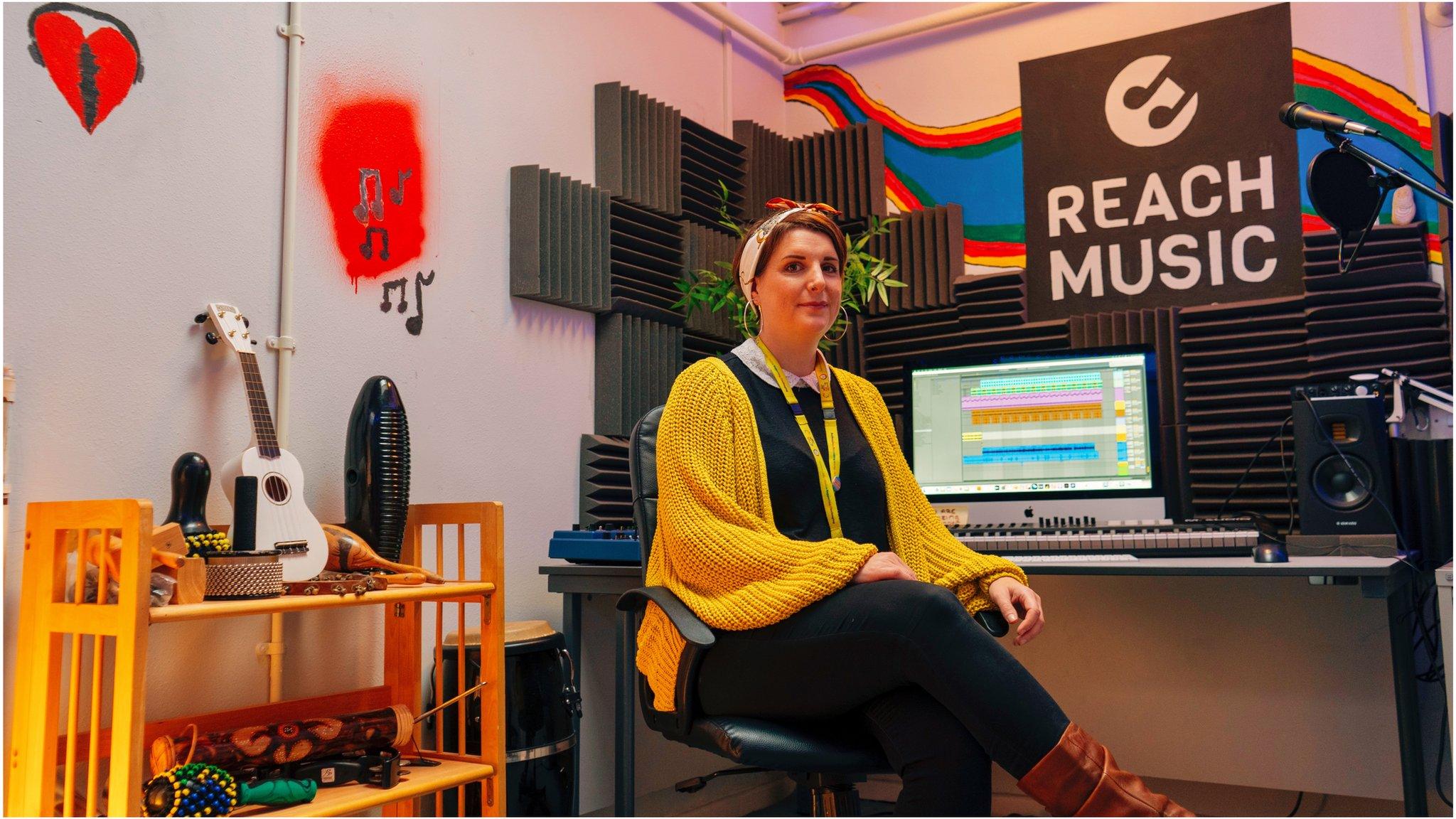Middlesbrough: The story of how Gary was stabbed seven times
- Published
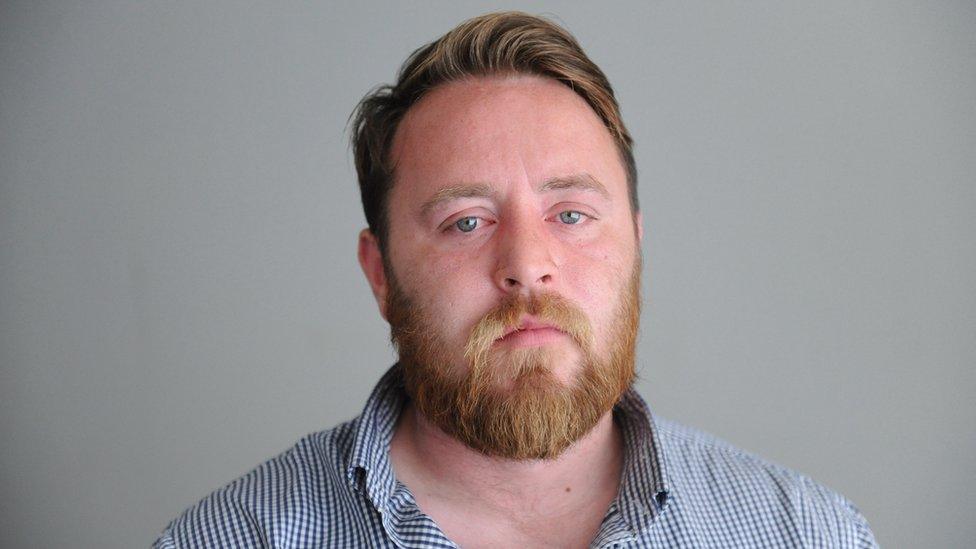
Gary Gill was stabbed seven times with knives, a screwdriver and an axe
Three men have been jailed for a brutal knife attack that left a man with life-threatening stab wounds. I filmed the aftermath as the BBC followed the work of the surgeon who saved his life and the victim as he recovered. This is their story.
The time is 19:42 on 9 January last year. I'm struggling to keep up with Barney Green as he rushes into the A&E department at James Cook Hospital in Middlesbrough.
He nods at three police officers who are standing outside a treatment room. The surgeon has abandoned a Sunday roast with his family to assess a man who has been stabbed seven times in the chest, leg and side. His weekend had been quiet, until now.
A scream comes from Gary Gill, the victim, who is lying on a treatment table. He's conscious and his eyes are wide with fear, his right trouser leg has been cut off while doctors and nurses assess his multiple injuries. Barney tells him: "We will look after you."
Gary replies: "I hope so mate, I don't want to die."
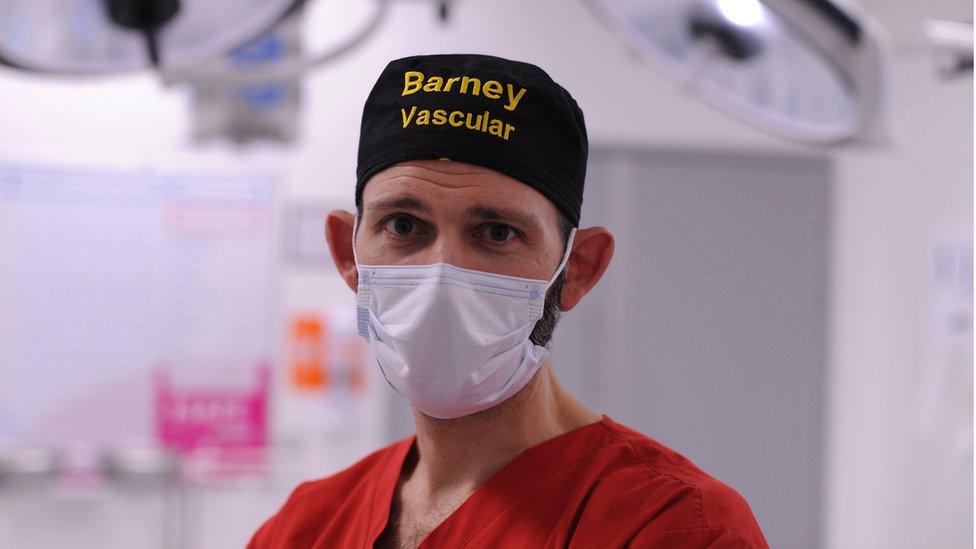
Barney Green works as a surgeon at James Cook Hospital
I try and stay out of the way, it's cramped around the bed and machines beep loudly nearby. There are at least 12 medical staff looking after Gary, stemming the flow of blood from the injuries, giving pain relief and making him comfortable.
Barney decides he will need to operate to assess how deep the stab wounds are and if any major organs are damaged.
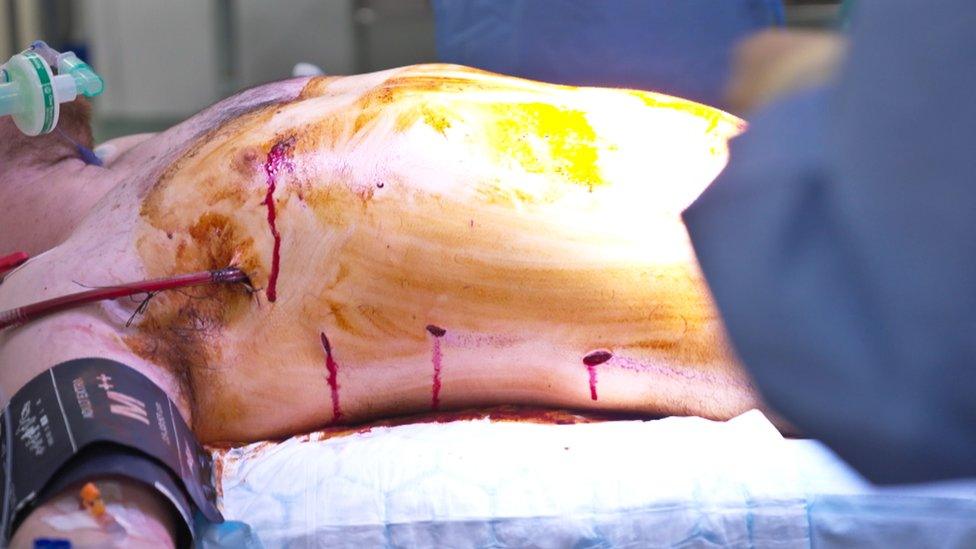
Gary was stabbed seven times in total
Teesside has one of the highest knife crime rates in the UK, and as a proportion of the population it's more than Greater Manchester and London and second only to Birmingham. Barney has been keeping his own tally.
"I looked at some data from our casualty department from the last three years and it works out that somebody comes into the emergency department at James Cook Hospital having been assaulted with a knife every three days," he says.
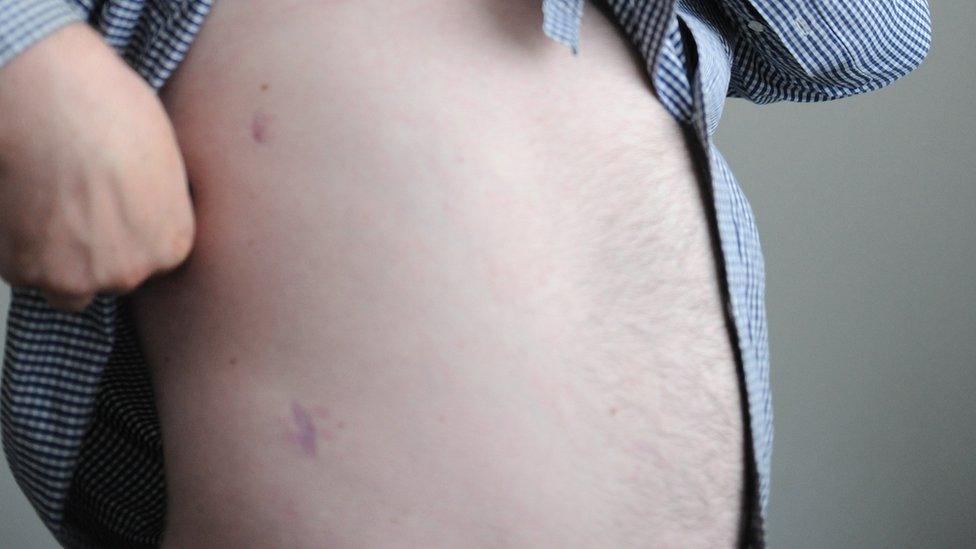
Gary Gill's injuries have healed but he said he still "struggles"
It's now 20:44. Back at the hospital we change into scrubs as we learn the grim details of how Gary ended up in A&E.
He was involved in a fight earlier in the day with three men. Gary thought that was the end of it until they came back later with knives, a screwdriver and an axe. But for now he can forget about the attack.
"We are going to give you some medicines that make you sleepy," the anaesthetist tells him as the operation gets under way.
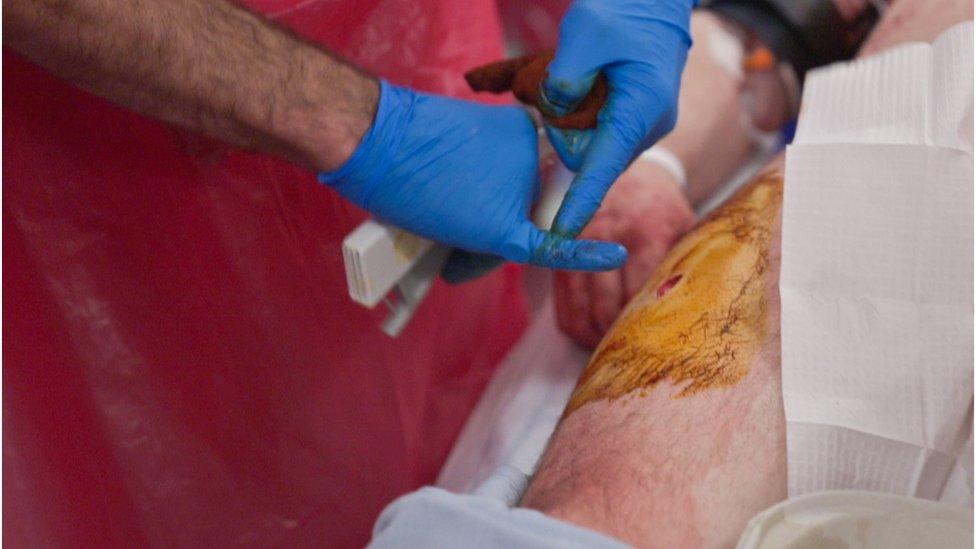
Gary needed three hours of surgery
A large cut is made into Gary's abdomen, opening up space for Barney and his colleague to see how serious the damage might be. He then checks off each organ.
"Has that gone into the liver at that level?", Barney asks. He answers his own question with a "yes".
"It has skirted by a whisker his right kidney but it has gone into his liver, now thankfully the body has stopped that bleeding," he says.
More than three hours after he was brought into A&E, Gary's operation is over and he is wheeled on to a ward for the start of an eight-day stay in hospital. Barney wearily takes off his operating gown.
"I love operating, I do not like operating on people who've been stabbed, it is just not right, we should not be having to waste hospital resource, time, emotion on things that humans are doing to humans," he says.

What can be done to stop knife crime?
In his office at Middlesbrough station, the Cleveland Police head of crime Det Ch Supt John Bent is showing me a large knife from a box containing hundreds of different blades.
"You wonder why somebody would be carrying something like that around with them," he says.
In March, extra funding from the Home Office was given to Cleveland Police to tackle violent crime.
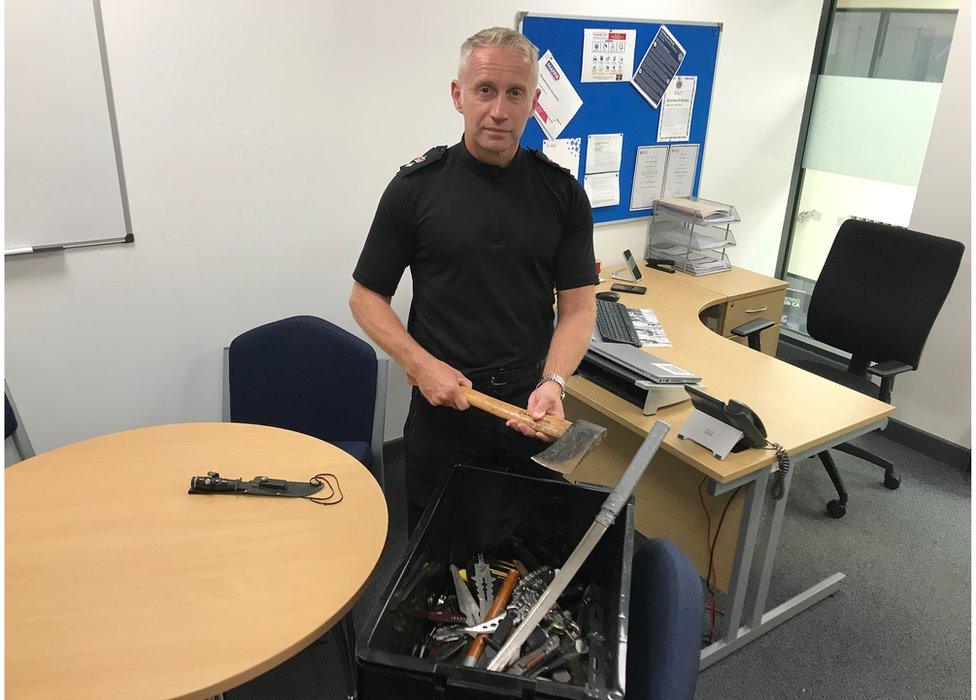
Det Ch Supt John Bent with some of the weapons taken off the streets
"I think Teesside has some significant problems… we've got high unemployment, we've got deprivation in the area... what we need to do is change attitudes and behaviours, particularly in young people, about carrying knives, and the dangers of carrying knives," he says.
Half a million pounds of the new funding has now been allocated to community groups in the hope of winning over hearts and minds.
And in one week last November, 513 knives and weapons were handed in across Cleveland, Durham and Northumbria police forces.

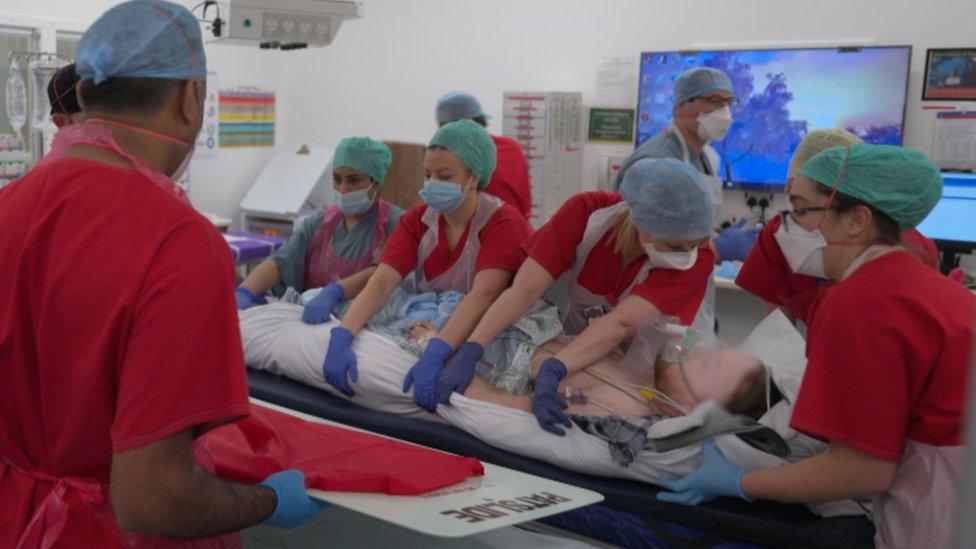
The team at James Cook saved Gary's life
It's months since I met Gary in A&E, and I'm in the street in Thornaby where the attack took place and knocking on his door. It opens very slightly and he looks wary until he recognises me and invites me in.
"All the healing process is done, physically," he says. "Mentally, I don't think it'll ever be totally healed... if I wasn't anxious before, I certainly am now."
"I struggle going to sleep, I struggle waking up, I struggle doing a lot of things, and that's kind of hard to admit really, but you know, that's the truth."
Gary, 35, explains the attack happened because some lads were harassing a family member next door.
The father of three went out into the street, an altercation ensued and they left, but came back later and set about him.
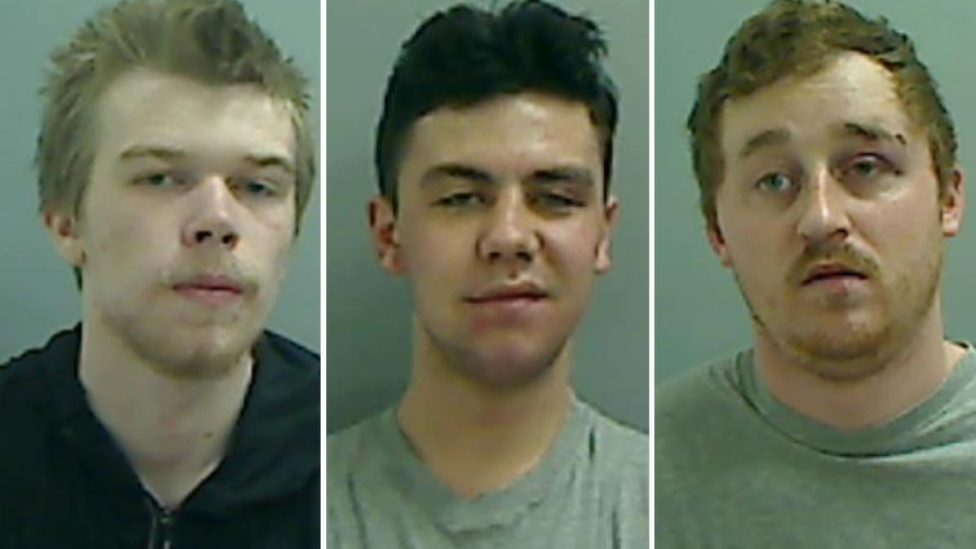
Josh White, Keaton Gibson and Connor Smith were all jailed for attacking Gary
Just over a year since the crime, three men appeared at Teesside Crown Court on Wednesday and were jailed over the attack.
Josh White, 21, of Meath Crescent, Thornaby, was jailed for eight-and-a-half years after admitting wounding with intent and possessing a knife.
Keaton Gibson, 21, of Langley Avenue, Thornaby, admitted unlawful wounding and possessing a blade and was locked up for three years.
Connor Smith, 23, of no fixed address, was found guilty of unlawful wounding and admitted carrying a blade and was also jailed for three years.
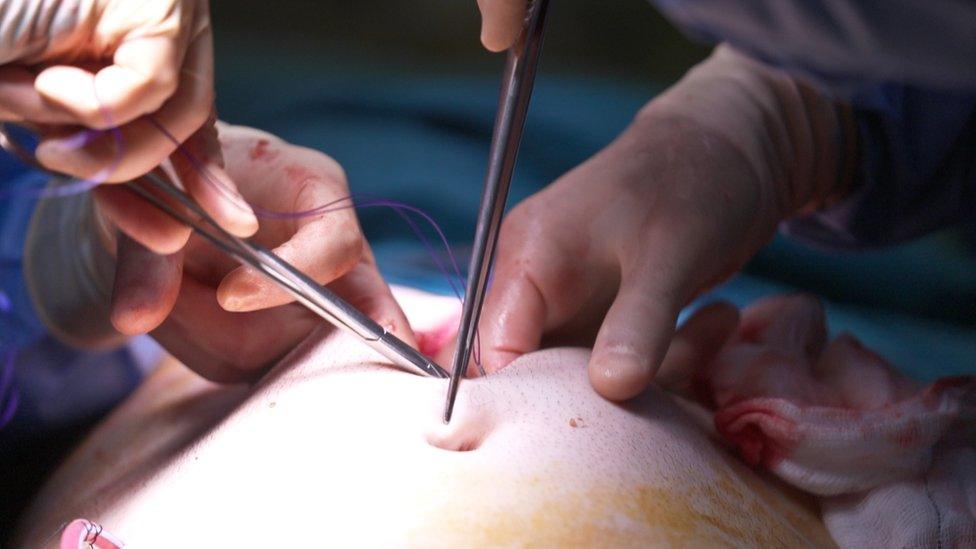
The attack narrowly missed Gary's kidney
Det Con Mick Matthews said the attack left Gary with "life-changing injuries to his vital organs".
"He has been scarred for life both physically and mentally, suffering the deep psychological effects of the reality of knife crime.
"The force will continue to do all it can to rid the streets of Teesside of weapons, and target those carrying knives and prevent such violent and abhorrent attacks."
Gary knows he's been very lucky, and is now trying to look to the future. Barney and the police acknowledge there is no quick fix for changing the culture on the streets, but at least now with this extra funding there's hope, Barney tells me.
"It's a long road, we have said before that the oak tree takes generations to grow but it starts with an acorn, unless we start to plant that seed now, we won't reap that benefit in years to come," he says.
Watch Knife Angels: What Happened Next on BBC iPlayer.

Follow BBC North East & Cumbria on Twitter, external, Facebook, external and Instagram, external. Send your story ideas to northeastandcumbria@bbc.co.uk, external.
Related topics
- Published25 October 2022
